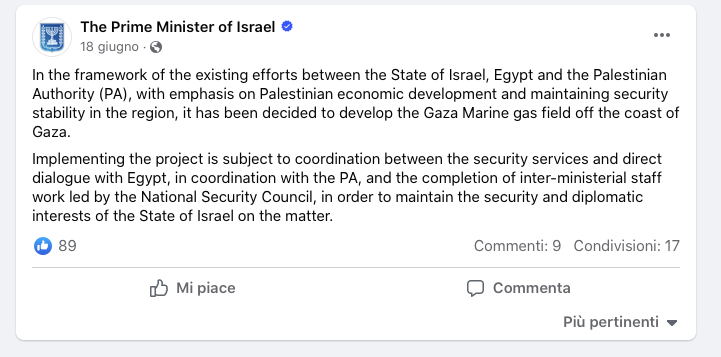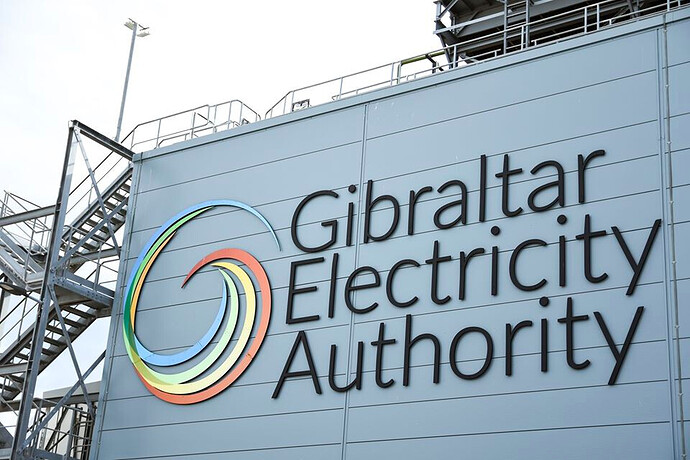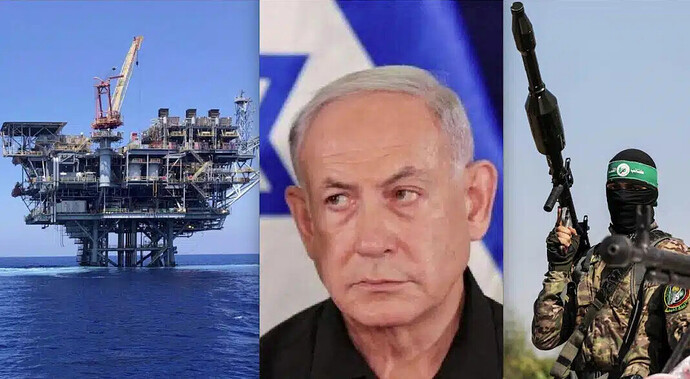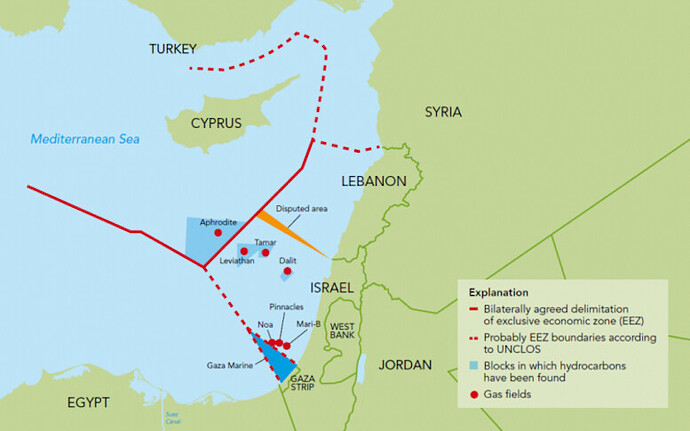The RELIGIOUS WAR behind GAZA MARINE GAS. Netanyahu & Hamas vs Christian Tycoon Ally of Palestinian Muslims
By
Fabio G. C. Carisio
June 2, 2024
by Fabio Giuseppe Carlo Carisio
VERSIONE IN ITALIANO
One of the important reasons for the genocide in Palestine cannot be understood without analyzing the background of the agreement for the exploitation of the gas fields called Gaza Marine as they are a few hundred nautical miles in front of the Strip tormented by Israel’s bombings.
But we cannot fully grasp the importance of this strategic project without analyzing the story of one of the main protagonists: the tycoon Samer Khoury who grew up in the Palestinian Christian family of his father Said who became famous throughout the Holy Land for having dedicated his soul, intelligence and donations to The Bethlehem Development Foundation project to revive the birthplace of Jesus Christ around the Church of the Nativity.
In 2000, the British Gas (BG) group discovered the Marine 1 and Marine 2 gas fields about 35 kilometers off the coast of Gaza after being granted an exploration license by the Palestinian National Authority. After Shell acquired BG in 2016, CC Oil & Gas and the Palestinian Investment Fund (PIF) acquired Shell’s working interest in the fields, with each party owning 50%.
According to CC Oil & Gas, the fields are estimated to contain over 1 trillion cubic feet of gas, similar to the size of the Karish gas field.
Khoury, tycoon of CC, was born to a Palestinian Christian family in Safed, Palestine in 1923. After attending St. Luke’s School in Haifa, he followed his cousin Hasib Sabbagh to Lebanon to study at the American University of Beirut, where they both graduated from the faculty of engineering. Upon returning home, they each founded a small construction company in Palestine.
After the founding of the State of Israel, both men fled again, this time with their families, to Lebanon’s capital, Beirut, where they began working on construction projects. Said and Sabbagh’s first assignment was at Tripoli airport.
Khoury said they were motivated by the Nakba, “the catastrophic expulsion from their homeland, Palestine, in 1948.”
The Christian Deal on Marine Gaza Gas blocked by the Hamas-Israel plot
Thanks to his historic entrepreneurial resourcefulness illuminated by authentic values of evangelical brotherhood, Said Khoury created an empire from nothing, establishing international relations with the Western world, especially in Greece where he went to live also to strengthen the bond with the origins of the Greek Orthodox family, in Palestine from which he was forced to flee by the Israelis, in Lebanon, where he began as a construction builder, in Syria, where he created the current multinational Consolidated Contractors Company (CCC) of which, after his death, his son Samer became president expanding its activities in the energy and industrial fields especially in Qatar and friendly Arab countries.
Friends of the Palestinians as well as the Christians: when the criminals of Western intelligence do not interfere as happened in the attack of 11 September 2001 facilitated by the CIA thanks to its jihadist collaborators…
The Christian entrepreneur Said Khoury
Khoury senior was so reliable and credible in his life that he managed to build alliances on the rock of his Christian faith both with the Syrian, Palestinian and Lebanese Shiite Muslims but also with the Sunnis of the Persian Gulf.Despite being a Christian of the Greek Orthodox Church, he has received 2 medals from the Russian Orthodox Church and dozens of other religious, institutional and academic awards in various Middle Eastern countries.
«Moved by his family’s Greek Orthodox and Palestinian roots, Khoury has a new vision for Bethlehem: Within 10 years, he wants to see 3 million tourists a year thronging the narrow streets. Three years in, he said, “We’re 5 percent to 10 percent there.”» wrote Elizabeth MacBride in a virtually exclusive interview with Samer for CNBC and YahooFinance.
«Paying it forward Khoury’s late father, Said, founded the Bethlehem Development Foundation, a nonprofit that has so far spent about $40 million, with projects underway to further restore the church, build playgrounds for children and buy buses to ferry tourists to sites in and around the town. The foundation also incorporated a fundraising nonprofit in the United States and plans a Washington dinner in early February. It aims to raise and spend $60 million more by 2027».
«”It’s a sad city when you enter,” said Khoury. “This is the center of Christianity, important for 2 billion people. My father said: ‘It is going to be a ghetto if nobody does anything.» she added to the journalist.
Samer Khoury
Said passed away in 2014, leaving the great dream of natural gas extraction platforms from the enormous Gaza Marine field in the hands of his son Samer. A project that would have indissolubly cemented the alliance between Christian, Palestinian and Arab men of good will, becoming the driving force for the rebirth of Palestine and therefore of the small country made famous by the biblical prophecy of Micah (Mi. 5.1)
«And you, Bethlehem of Ephratah, so small to be among the capitals of Judah, from you will come to me the one who is to be the ruler in Israel; his origins are from antiquity, from the most remote days»
Instead, in the short space of a few months, a project that seemed to have been defined seems to have become a mirage for a war that is truly too suspicious, given the plan of genocide, ethnic cleansing and diaspora implemented by the Zionist Prime Minister Benjamin Netanyahu against the Palestinians from the Gaza Strip to expel them in the Egyptian region of Sinai, premeditated by Israel well before the Hamas attack on the kibbutzim.
Netanyahu’s Approval of Christian-Palestinian Marine Gaza Project
Three dates summarize the tragic fate of the gas fields among the largest in the Mediterranean Sea.
The announcement of 18 June 2023 on Facebook by Israeli Prime Minister Benjamin Netanyahu on the agreement reached for the development of the project between the three countries involved: Israel, the State of Palestine (already recognized by the majority of UN countries) and Egypt.
This post, of crucial importance for the Middle East, incredibly received very few views as if it had been hidden by the Israeli government itself in a way that was then made terribly suspicious by the genocide in Gaza due to the forced depopulation.

The post of Israeli Prime Minister Benjamin Netanyahu
Offshore Technology then wrote:
«The Israeli Government has issued preliminary approval for the development of the Gaza Marine project 30km off the coast of the Gaza Strip in the eastern Mediterranean Sea. The field is located offshore Gaza, a Palestinian enclave that is controlled by Hamas, reported Xinhua via China.org.cn».
A statement from Israeli Prime Minister Benjamin Netanyahu’s office read: “As part of the ongoing processes between the State of Israel and Egypt and the Palestinian Authority, with an emphasis on the development of the Palestinian economy and maintaining security stability in the region, it was decided to advance the development of the gas field in front of Gaza (Gaza Marine).”
The huge Gaza Marine gas field
Netanyahu’s office said the project implementation would require security coordination with neighbouring Egypt and the Palestinian Authority.
«The development of the Gaza Marine field, which was discovered by British Gas (BG) in 2000, has been delayed due to conflict between Israel and Palestine, economic factors and political disputes.As per the estimates, the Gaza Marine field holds more than one trillion cubic feet of natural gas».
A Peace Agreement between Israel and Palestine vanished into thin air
The article dated August 3, 2023 written by Egyptian diplomat Hesham Youssef on the website of the United States Institute of Peace on the importance of that geopolitical agreement.
«Amid today’s dismal Israeli-Palestinian context, positive developments have been in short supply. However, Prime Minister Benjamin Netanyahu’s June announcement of preliminary approval for the development of the Gaza Marine gas fields provided a rare glimpse of a potential win-win opportunity. For the Palestinians, it could provide a much-needed boost to their lagging economy and the cash-strapped Palestinian Authority (PA)».
«On the Israeli side, it allows the Netanyahu government to claim it is assisting in improving living conditions in Gaza and could lead to less U.S. pressure on issues like settlement expansion. In the big picture, this is another example of how energy is increasingly becoming a focus for potential win-win agreements in the East Mediterranean».
The Threats of Hamas Terrorists Financed and Armed by the West
The failure of the Israeli internal, external and military intelligence services (Skin Bet, Mossad and Aman respectively) to prevent the “Al-Aqsa Flood” operation launched by the Hamas armed brigade on 7 October despite specific warnings from the Egyptian 007s about the imminent assault.
It is no coincidence that we focus on the attack prevention flop rather than the action itself.
Since in previous investigations we reported the authoritative opinion of the former official of the American counterintelligence Central Intelligence Agency, Robert Giraldi, on the interconnections between Hamas and the Mossad, the Israeli counterintelligence, on the alleged financing provided by the USA to Sunni jihadist extremists of the similar to Al Qaeda and ISIS (both terrorist organizations used by the CIA first in the Balkans and then in Syria), on American-made weapons smuggled from Ukraine to the Middle East by CIA agents and ending up in the hands of Palestinian terrorists, and finally the speculations launched by Israeli traders on October 6, 2023 as if they were aware of the impending doom (research by an academic from the University of New York).
Hence the steel alliance on gas, which would have united Christian, Shiite and Sunni investors with Israelis so much so as to seem even more relevant for the purposes of Middle Eastern peace than the Abrahamic Pacts signed between Tel Aviv and Arab countries with the US mediation, failed precisely because of the failure of Israeli intelligence, considered the most powerful in the world and suspected of having had a significant role in the attacks of 11 September 2001 as well as in the training of Al Baghdadi, ISIS caliph but considered from the Iraqi People’s Liberation Movement a Mossad agent. We have written long and documented investigations on all these things, as can be seen from the links above and below.
The Jerusalem Post wrote on October 20, 2022:
« Hamas warned the Palestinian Authority against handling the issue of natural gas fields located off the coast of the Gaza Strip on Thursday, just days afterPA Prime Minister Mohammed Shtayyehannounced that a team would be formed to conclude an agreement with Egypt concerning the gas. The development of the fields has been held up for over two decades due to disputes with Israel and economic difficulties, including disputes surrounding an agreement granting Israel surplus gas from the field».
«The Gaza Strip is under an Israeli maritime blockade which restricts Gazans from going more than at most 12 nautical miles from the coast.“All previous experiences have proven the inability of the Palestinian Authority to manage the wealth of our Palestinian people,” said Hamas to Al-Watan news. “The Authority is not qualified to receive the gas file, as it is involved in cases of corruption, waste of money and misconduct.”».
In a single attack Hamas achieved the widely proclaimed objective in 2022 of preventing the Palestinian National Authority from exploiting the Gaza Marine, Israel that of ruining a project with uncomfortable alliances with multinationals led by Christian and Muslim leaders after the mysterious behind – front made by Shell which, after purchasing British Gas which had discovered the field, sold the shares it owned to Khoury’s Consolidated Contractors Company, with Palestinian offices in Gaza and Ramallah and dozens of others in Arab countries and Middle Eastern countries, and the Palestine Investment Fund (PIF): the sovereign fund for the development of Palestine supported by partnerships with Arab banks and institutions from around the world.
Terrorism and War over the Failure of the Christian and Palestinian Financial Project
The Palestine Investment Fund (PIF) is the sovereign development fund for Palestine. The PIF pursues a double bottom line by maximizing impact through innovation and investing in strategic projects in underdeveloped and vital sectors, all while achieving sustainable returns.
PIF was founded in 2003, as a public company registered with the Ministry of National Economy, under Palestinian company law, and is wholly owned by the Palestinian people. PIF is the leading investor in renewable energy, agriculture and agribusiness, healthcare, hospitality and entrepreneurship in Palestine.
Mohammad Mustafa, current prime minister of the Palestinian National Authority
To understand the geopolitical importance of this organization, it is enough to remember that its president Mohammad Mustafa, a former World Bank economist with a degree from George Washington University, was recently appointed prime minister of the Palestinian National Authority.
Curiously, the British Shell plc. it withdrew by selling its shares in Gaza Marine as it had already done in the Donbass of Ukraine, renouncing it even before the 2014 coup in Kiev with which George Soros’ revolution financed by NATO countries brought down the pro-Russian regime. What exceptional foresight!
Or were they already aware of the occult pact to block the agreement on the project by legitimizing Israel’s disproportionate military reaction in the Gaza Strip to eliminate Hamas (but also extended to the West Bank where the Palestinian National Authority recognized by the UN governs) thanks to the protection of the USA and NATO countries (UK and EU in the lead) to end the diaspora of Palestinians thus canceling all rights of the latter in the maxi-business but also implementing the diabolical “Greater Israel” plan of the Zionist Netanyahu who feels authorized – above all by the mandate of Anglo-American Freemasonry – to rebuild the Kingdom of the Star of David which fell into disgrace precisely due to the failure of the Jews to recognize the Messiah born in Bethlehem 2000 years ago.
https://www.vtforeignpolicy.com/2024/06/the-religious-war-behind-gaza-marine-gas-netanyahu-hamas-vs-christian-tycoon-ally-of-palestinian-muslims/






